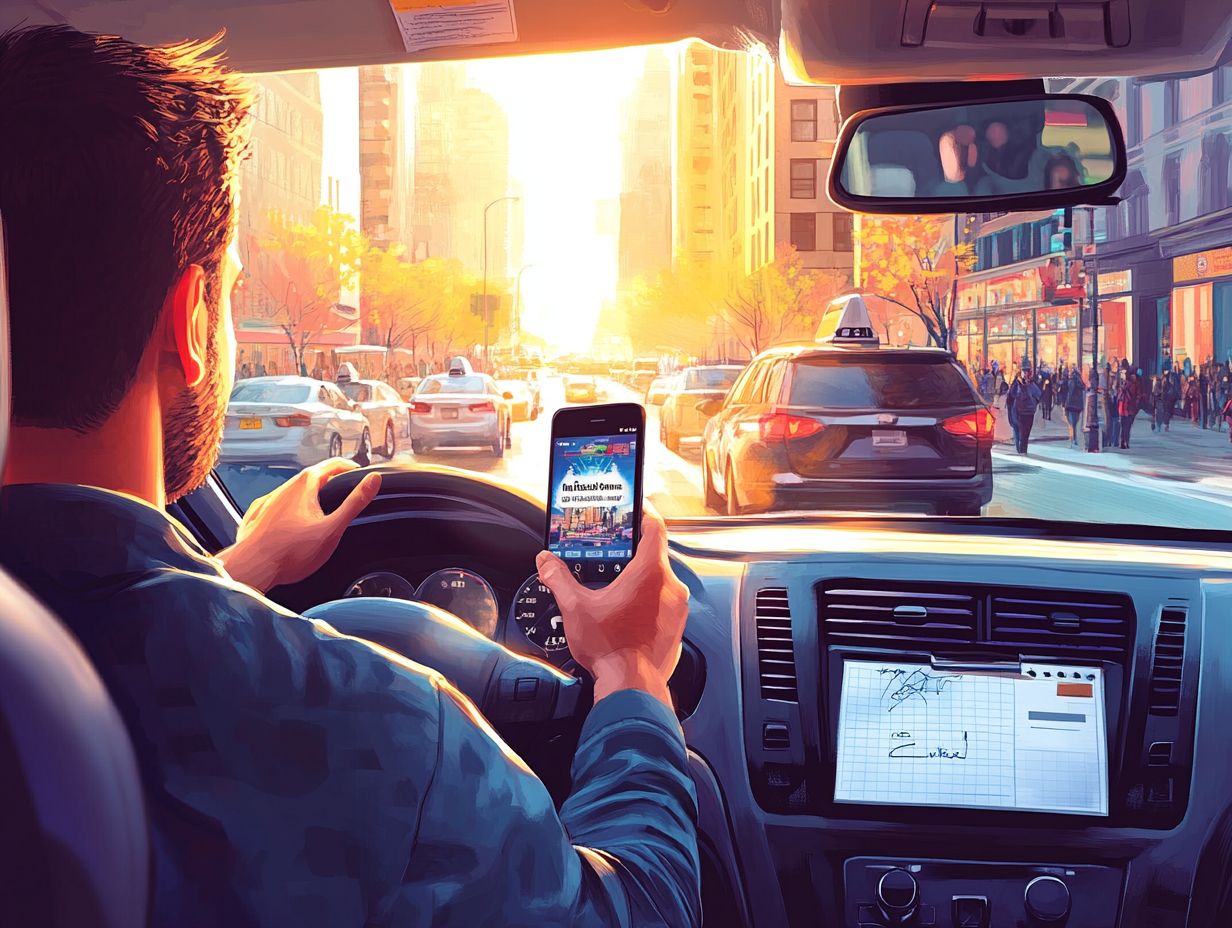Exploring Coverage for Rideshare Drivers
Rideshare driving has revolutionized transportation, but it also presents distinct challenges particularly when it comes to insurance.
As a rideshare driver, understanding the various types of coverage available is essential for your protection and peace of mind. This article provides a comprehensive breakdown of different insurance options, highlights the importance of having adequate coverage, and helps you select the policy that best suits your needs.
You’ll also find tips to help you keep your insurance costs down. Dive in to navigate the world of rideshare insurance with confidence!
Contents
- Key Takeaways:
- Essential Insurance Options for Rideshare Drivers
- The Importance of Insurance for Rideshare Drivers
- How to Choose the Right Insurance Coverage
- Tips for Lowering Insurance Costs
- Frequently Asked Questions
- What is rideshare insurance coverage?
- Do rideshare drivers need additional insurance coverage?
- Why do rideshare drivers need specialized insurance?
- What type of coverage do rideshare drivers need?
- Is rideshare insurance expensive?
- What happens if a rideshare driver doesn’t have the proper insurance coverage?
Key Takeaways:

- Rideshare drivers should have proper insurance coverage to protect themselves, their passengers, and their vehicles from potential risks and coverage gaps.
- Personal auto insurance may not provide adequate coverage for rideshare driving, so it’s important to consider commercial auto insurance or rideshare company insurance.
- When choosing insurance coverage, rideshare drivers should consider factors such as coverage limits, deductibles, and additional benefits, while exploring strategies for lowering insurance costs.
Rideshare driving stands out as a transformative transportation solution, enabling you to earn income by providing rides to passengers through platforms like Uber and Lyft, while also catering to food delivery via services such as DoorDash and Postmates. This model transforms how we get around and gives you exciting flexibility!
The rapid expansion of rideshare services in recent years has fundamentally altered how individuals approach transportation. These services often present a more convenient and cost-effective alternative to traditional taxis. Operated through user-friendly mobile apps, these platforms seamlessly connect you with passengers in real-time, optimizing routes and minimizing wait times.
Consequently, rideshare services have gained significant traction in urban areas, contributing to a noticeable decline in taxi ridership and reshaping city traffic patterns.
With the rise of rideshare driving, many now view it not merely as a side gig but as a genuine employment option. This shift reflects a broader trend toward the gig economy a term for short-term, flexible jobs and underscores the pivotal role of technology in redefining transportation norms.
Understanding the array of insurance coverage options available for rideshare drivers is crucial for both compliance and protection.
Rideshare insurance includes distinct categories such as personal auto insurance, commercial auto insurance, and specialized rideshare coverage tailored to meet the unique needs of drivers working with platforms like Uber and Lyft. Understanding the role of coverage in financial planning for drivers ensures you are adequately covered while navigating the complexities of ridesharing.
Personal Auto Insurance
Personal auto insurance is designed to protect you as an individual vehicle owner for personal use. However, it often falls short when it comes to rideshare activities unless you secure the proper endorsements.
As a rideshare driver, you’re using your personal vehicle for commercial purposes. It’s vital to understand the limitations of your personal auto insurance policy and how it can affect your insurance costs.
When you engage in rideshare services, you may find yourself in a tricky situation; standard coverage limits usually exclude accidents that happen while you are transporting passengers for hire. To navigate this, it’s important to understand coverage for self-driving cars, as many personal policies contain specific exclusions that can leave you vulnerable to financial risks during rideshare activities.
To address this coverage gap, obtaining insurance endorsements specifically designed for rideshare driving is essential, as they can provide you with the necessary protection. For more information, check out coverage for delivery drivers.
It’s crucial for you to have an open discussion with your insurance agent about your options. This way, you can ensure you have adequate liability coverage and fully understand how your insurance costs might shift based on your intended use of the vehicle.
Don t wait! Review your coverage today to ensure you re fully protected.
Commercial Auto Insurance

Commercial auto insurance offers broader coverage options tailored for your needs as a driver using your vehicle for business purposes, including rideshare services. This type of insurance is essential for protecting you against liability claims, which are claims made against you when you cause damage or injury to others. It can also be customized to meet the requirements set by major rideshare companies like Uber and Lyft.
Having the right coverage shields you from potential financial setbacks and provides you with peace of mind while you re on the road. Liability coverage is a crucial aspect of this insurance, offering protection in case of accidents involving passengers or other vehicles.
Rideshare companies typically require drivers to maintain certain minimum coverage levels. Thus, commercial auto insurance is vital for meeting these essential prerequisites. This specialized insurance enhances your protection and boosts the trust and safety levels for passengers who depend on rideshare services.
Rideshare company insurance is designed specifically for drivers working with ridesharing platforms like Uber and Lyft. It addresses unique insurance needs that traditional auto policies often overlook. This coverage is crucial for protecting you while you’re logged into the app and waiting for ride requests.
Unlike standard auto insurance, which typically covers personal use only, rideshare insurance adds an extra layer of protection when you’re actively accepting ride requests and transporting passengers. While rideshare companies offer liability coverage for injuries and damages to third parties, your personal insurance might not cover incidents occurring while driving for a rideshare service.
To ensure you have comprehensive coverage, many drivers choose supplemental rideshare insurance. This means adding extra coverage when driving for rideshare services. For more details on this, consider understanding coverage for on-demand services, which helps safeguard your finances and mitigate risks associated with the ridesharing business.
The significance of insurance for rideshare drivers is very important, as it protects you from potential financial struggles arising from accidents, liability claims, or damage. Given the unique circumstances surrounding rideshare driving, understanding your insurance needs is essential.
This knowledge enables you to avoid expensive coverage gaps and ensures that you have sufficient protection, especially in the face of fluctuating insurance premiums.
Coverage Gaps and Risks
Coverage gaps can pose significant risks for you as a rideshare driver. They can leave you uninsured during critical moments, particularly when you’re actively driving for a rideshare service. Knowing about these gaps is key to protecting yourself and ensuring that you meet insurance requirements.
Consider this scenario: you switch on your app but haven’t accepted a ride yet. During this waiting period, your personal auto insurance may not cover any accidents, leaving you exposed to financial liabilities. Understanding the importance of coverage for temporary drivers is crucial, as some policies might even exclude rideshare activities altogether, failing to recognize the unique nature of this work.
To avoid these pitfalls, carefully review your insurance policy for any exclusions or limitations. It s wise to consider additional rideshare insurance options to effectively bridge these gaps. By being proactive and well-informed, you can safeguard yourself against unforeseen incidents and ensure your peace of mind while on the road.
How to Choose the Right Insurance Coverage

Selecting the appropriate insurance coverage is crucial for rideshare drivers, as it significantly influences both their financial security and peace of mind. Understanding coverage for car sharing programs is an important aspect of this process.
By assessing your unique insurance requirements, you can effectively compare different options and secure competitive quotes from top insurance providers. This ensures that you choose a policy that aligns perfectly with your needs.
Don t leave your financial future to chance! Having the right insurance can make all the difference.
Review your insurance policy today and take charge of your coverage to stay protected!
Factors to Consider
When selecting insurance coverage, you should carefully evaluate several key factors. These include your specific insurance needs, the type of liability coverage required, and the overall cost represented by insurance premiums.
Each of these elements plays a crucial role in determining the suitability and effectiveness of the policy you choose.
Your driving frequency can significantly impact your insurance requirements. If you drive often, comprehensive coverage may be necessary. If you drive less frequently, a minimal policy might be enough.
The type of vehicle you own also matters. Luxury or high-performance cars typically demand more robust coverage options. Local regulations may have specific insurance requirements that could influence your decision.
By getting to know these key factors, you help protect your financial interests.
Tips for Lowering Insurance Costs
Lowering your insurance costs is crucial for rideshare drivers. It helps maximize earnings while keeping expenses low.
By employing smart strategies like comparison shopping and asking about available discounts, you can obtain more affordable coverage. Consider choosing a higher out-of-pocket cost before insurance pays to save even more.
Strategies for Affordable Coverage
Implementing strategies for affordable coverage can be a game-changer for rideshare drivers. It allows you to enjoy financial security without straining your budget.
By exploring different insurance options and obtaining multiple quotes, you can make informed decisions that lead to tailored, cost-effective solutions.
One effective approach is to consider bundling various insurance policies. For example, merging your auto and home insurance often results in notable discounts.
Maintaining a clean driving record not only secures lower premiums but can also unlock additional savings. Many insurers offer safe driver programs that provide reduced rates for participating in driver safety courses.
By researching and leveraging these strategies, you can navigate the insurance landscape with confidence and ease.
Frequently Asked Questions

Rideshare insurance coverage is a type of insurance that protects drivers using their personal vehicles for ridesharing services like Uber or Lyft, making it crucial to understand coverage for transportation companies.
Yes, most personal auto insurance policies do not cover commercial activities like ridesharing. Therefore, it is important for rideshare drivers to have additional coverage to protect themselves and their vehicles.
Rideshare drivers need specialized insurance because personal auto insurance policies typically have exclusions for commercial activities. This is particularly important for navigating coverage for seasonal drivers, as personal insurance may not cover any damages or injuries in the event of an accident while working as a rideshare driver.
Rideshare drivers need a specific type of coverage known as rideshare insurance or Transportation Network Company (TNC) insurance. This type of insurance covers drivers when they are logged into the ridesharing app and waiting for a ride request.
The cost of rideshare insurance varies depending on the insurer and coverage options chosen. However, it is usually more affordable than commercial insurance and provides essential protection for rideshare drivers.
If a rideshare driver does not have the proper insurance coverage, they could be personally liable for any damages or injuries that occur during a ride. This could result in a significant financial burden and potentially legal consequences.






